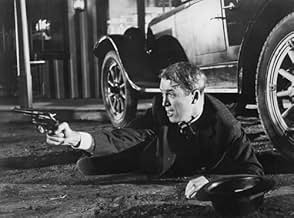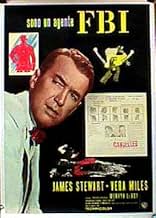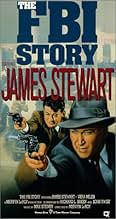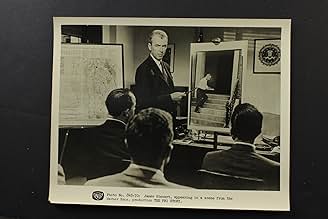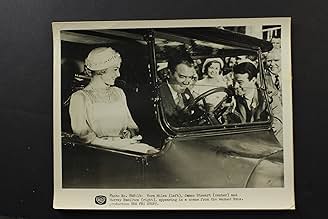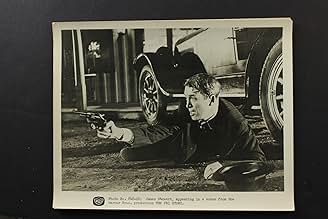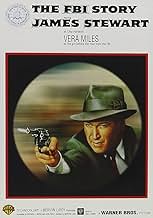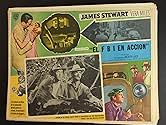NOTE IMDb
6,5/10
4 k
MA NOTE
Ajouter une intrigue dans votre langueA dedicated FBI agent recalls the agency's battles against the Klan, organized crime and Communist spies.A dedicated FBI agent recalls the agency's battles against the Klan, organized crime and Communist spies.A dedicated FBI agent recalls the agency's battles against the Klan, organized crime and Communist spies.
- Récompenses
- 1 nomination au total
Ken Mayer
- Casket Salesman
- (as Kenneth Mayer)
Victor Adamson
- Train Passenger
- (non crédité)
Luana Anders
- Mrs. Graham
- (non crédité)
Histoire
Le saviez-vous
- AnecdotesTwo FBI agents were on the set at all times.
- GaffesJennie forgets her speech at a mid-term Honor Society event. When her father comforts her in the family car a few moments later, the cherry blossoms are in bloom; this usually occurs in early April in Washington (DC). However, after they leave the car with the radio still on, a news bulletin breaks in, announcing the attack on Pearl Harbor, which took place on December 7, 1941. No cherry blossoms would have been in bloom then, nor would the weather have been mild enough as depicted in the accompanying scenes.
- Citations
[first lines]
John Michael Hardesty: [narrating] Webster's International Dictionary defines murder as the unlawful taking of human life by another human being. On a November evening in 1955, the definition became obsolete. A mass murder was being planned.
- ConnexionsEdited from Écrit dans le ciel (1954)
Commentaire à la une
This is an entertaining "history" of the FBI, but it should be viewed as fiction, because that's exactly what it is. What else could it be when J. Edgar Hoover personally approved and had a cameo role in the production. James Stewart is excellent, as usual, and the supporting cast, except for the talentless Vera Miles, is good. Murray Hamilton is especially good in a supporting role as Stewart's partner and best friend. The FBI accomplishments that the film highlights are undoubtedly all true. What is significant is what it leaves out.
One of the most shameful parts of the film is the depiction of the killing of John Dillinger. It is portrayed pretty much as it happened, but no mention at all is made of Melvin Purvis, the Chicago Bureau Chief who headed the operation. Instead, the operation is depicted as if the fictional Chip Hardesty were running it. It has been said that Hoover was jealous of the publicity that Purvis received after Dillinger was killed; Purvis was subsequently transferred to a remote outpost, and shortly afterward left the FBI. This is no doubt why Purvis was never mentioned in the film. But this viewer, at least, paused to think that if Purvis was treated this way, what about all the agents who conducted all the other operations depicted in the film. Were they also completely ignored and replaced by the fictional Hardesty.
The film is probably accurate in its portrayal of FBI activity up through the end of WWII. However, after that point, the film would have us believe that the only threat facing the US came from international communism, which is no doubt what Hoover believed. Never mind the Mafia. Never mind the lynchings that were still going on in the South. Never mind that blacks were being intimidated to keep them from voting in much of the South. I don't know if the FBI had started wiretapping Martin Luther King by the time this film was made, but if not, it wasn't very long afterward that it started.
As I said at the outset, this is pretty good entertainment, but it should be viewed as the sanitized fictionalization that it is.
One of the most shameful parts of the film is the depiction of the killing of John Dillinger. It is portrayed pretty much as it happened, but no mention at all is made of Melvin Purvis, the Chicago Bureau Chief who headed the operation. Instead, the operation is depicted as if the fictional Chip Hardesty were running it. It has been said that Hoover was jealous of the publicity that Purvis received after Dillinger was killed; Purvis was subsequently transferred to a remote outpost, and shortly afterward left the FBI. This is no doubt why Purvis was never mentioned in the film. But this viewer, at least, paused to think that if Purvis was treated this way, what about all the agents who conducted all the other operations depicted in the film. Were they also completely ignored and replaced by the fictional Hardesty.
The film is probably accurate in its portrayal of FBI activity up through the end of WWII. However, after that point, the film would have us believe that the only threat facing the US came from international communism, which is no doubt what Hoover believed. Never mind the Mafia. Never mind the lynchings that were still going on in the South. Never mind that blacks were being intimidated to keep them from voting in much of the South. I don't know if the FBI had started wiretapping Martin Luther King by the time this film was made, but if not, it wasn't very long afterward that it started.
As I said at the outset, this is pretty good entertainment, but it should be viewed as the sanitized fictionalization that it is.
- wjfickling
- 26 juil. 2002
- Permalien
Meilleurs choix
Connectez-vous pour évaluer et suivre la liste de favoris afin de recevoir des recommandations personnalisées
- How long is The FBI Story?Alimenté par Alexa
Détails
- Date de sortie
- Pays d’origine
- Langue
- Aussi connu sous le nom de
- The FBI Story
- Lieux de tournage
- Sociétés de production
- Voir plus de crédits d'entreprise sur IMDbPro
- Durée2 heures 29 minutes
- Rapport de forme
- 1.66 : 1
Contribuer à cette page
Suggérer une modification ou ajouter du contenu manquant

Lacune principale
By what name was La police fédérale enquête (1959) officially released in India in English?
Répondre

